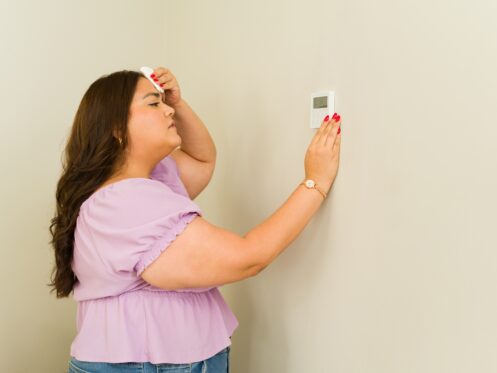There’s nothing worse than an air conditioner that keeps turning itself off before the house cools down. This is known as short-cycling, and it’s one of the most common issues that plague AC systems in humid climates like ours.
Short-cycling doesn’t just make your home uncomfortable; it also hints that something deeper might be wrong inside your cooling system. Left unchecked, it can cause your air conditioner to wear out much faster, waste energy, and even raise your energy bills.
But the good news? You can fix it, and prevent it, with the right approach and a little help from Erica’s Plumbing, Air Conditioning & Restoration.
What Is AC Short-Cycling?
Short-cycling means your air conditioner is turning on and off too frequently before it has a chance to complete a full cooling cycle. Instead of running for a steady 10–15 minutes, it might shut off after just a few minutes and then start right back up again.
When this happens, your AC system never reaches its full potential. It struggles to regulate the temperature properly, your home feels inconsistent, and your comfort takes a hit.
Over time, this on-off behavior puts unnecessary stress on the compressor and other key components. Think of it like constantly stopping and starting your car engine instead of taking a nice, smooth drive down the road. It’s a lot harder on the system!
What Causes Short-Cycling?
Several things can trigger this frustrating pattern. Sometimes, it’s a quick fix, like a clogged air filter. Other times, it’s a sign of a deeper mechanical or electrical problem. Let’s look at a few of the most common culprits behind short-cycling:
- Dirty Air Filters: When the air filter is clogged, it restricts airflow and makes the system overheat. To protect itself, the AC shuts off prematurely.
- Low Refrigerant Levels: If your AC doesn’t have enough refrigerant, the pressure in the system drops, which can cause the compressor to cycle off too early.
- Oversized Units: Bigger isn’t always better! An oversized air conditioner cools the home too quickly, causing it to turn off before removing enough humidity, leading to short, frequent bursts of activity.
- Electrical Issues or Faulty Thermostat: Bad wiring or a miscalibrated thermostat can confuse the system into thinking the home has reached the set temperature when it hasn’t.
- Frozen Evaporator Coils: Ice buildup on coils interrupts the heat exchange process, forcing the AC to shut off repeatedly.
Whether it’s a simple fix or something that needs professional repair, catching the issue early keeps your system healthy and your home comfortable.
How to Diagnose Short-Cycling
If you suspect your AC is short-cycling, a little detective work can go a long way before calling in the pros. Here’s how to spot what’s really going on:
1. Observe the Cycle Length
Pay attention to how long your AC runs before it shuts off. A healthy cooling cycle should last around 10–15 minutes. If it’s consistently turning off after only 2–5 minutes, that’s a clear red flag.
2. Check the Air Filter
Pull out your air filter and inspect it. If it’s caked in dust and debris, it’s likely choking your system. Replace it and run the AC again to see if the cycle stabilizes.
3. Inspect the Thermostat Placement
Thermostats located too close to a vent, window, or heat source can cause false readings. If your thermostat is getting blasted by cool air or sunlight, it may think your home is colder (or warmer) than it really is.
4. Look for Ice on the Coils
Turn off your AC and check for frost or ice buildup on the evaporator coils. If you spot ice, that’s a sign of restricted airflow or low refrigerant levels.
5. Listen for Unusual Noises
If your AC sounds like it’s struggling to start or makes clicking noises before shutting down, there could be an issue with the compressor or capacitor.
6. Monitor Indoor Humidity
Short-cycling prevents your AC from dehumidifying the air effectively. If your home feels clammy or sticky, that’s another sign your system isn’t running long enough to remove moisture.
7. Review Energy Bills
Unexplained spikes in your electric bill often signal short-cycling, since your system draws more power starting up repeatedly than it does running steadily.
Why Short-Cycling Is Bad for Your AC
Short-cycling may seem like a minor inconvenience, but over time, it can cause real damage to your system. Every time your air conditioner starts up, it draws a heavy surge of electricity and puts strain on internal components, especially the compressor. When this process happens too often, parts wear out faster than they should.
Beyond wear and tear, short-cycling drives up energy costs. Constant restarts use more electricity than steady operation, which means your bills climb while your comfort drops. Plus, your AC won’t have time to remove humidity properly, leaving the air sticky and uncomfortablem which is a big problem in Florida’s tropical climate. If left unchecked, short-cycling can even lead to complete system failure, leaving you with an expensive repair or replacement on your hands.
Tips to Prevent Short-Cycling
Now that you know how harmful short-cycling can be, the next step is learning how to stop it before it starts. Here’s how you can keep your AC running smoothly all season long:
- Change Air Filters Regularly: The simplest and most effective way to prevent short-cycling is by replacing your air filters every one to three months. Clean filters allow proper airflow, reduce strain, and help your AC maintain consistent cooling cycles.
- Schedule Routine AC Maintenance: A professional tune-up catches small problems before they snowball into bigger ones. During a maintenance visit, technicians check refrigerant levels, clean coils, inspect wiring, and calibrate your thermostat to prevent short-cycling.
- Make Sure Your System Is Properly Sized: If you’re upgrading your AC or moving into a new home, make sure the unit is properly matched to your home’s square footage. An oversized or undersized system will struggle to regulate temperature efficiently, leading to short-cycling.
- Keep Vents and Registers Clear: Blocked vents make it harder for your AC to circulate air. Move furniture, rugs, or curtains that might obstruct airflow, and make sure every room has open, unobstructed registers.
- Check the Thermostat Settings: Set your thermostat to “Auto” rather than “On.” When it’s set to “On,” the fan runs constantly, which can confuse your system and disrupt normal cycling patterns. Also, make sure the thermostat is placed in a neutral location away from direct sunlight or cold drafts.
- Inspect the Outdoor Unit: Leaves, debris, or overgrown plants around your condenser can restrict airflow. Keep at least two feet of clearance around the outdoor unit and clean off dirt or buildup regularly.
- Seal Air Leaks: If cool air escapes through gaps around doors, windows, or ducts, your system will have to work harder to compensate. Sealing these leaks keeps your home’s temperature stable and reduces strain on your AC.
These steps go a long way in keeping your air conditioner in good shape. A little bit of maintenance can make a world of difference in performance and longevity.
Keep Your AC in Mint Condition With Erica’s
When short-cycling strikes, don’t sweat it. Erica’s Plumbing, Air Conditioning & Restoration is here to help. Our friendly, highly trained technicians know the ins and outs of every major AC brand, and we specialize in diagnosing and fixing short-cycling issues fast.
We also offer comprehensive AC tune-ups and maintenance services throughout Palm Beach and Broward counties, designed to keep your system efficient, quiet, and reliable year-round. Regular maintenance is key to keeping your comfort consistent and your energy bills in check. So if your AC is short-cycling, blowing warm air, or just not keeping up with the Florida heat, give us a call.
Let Erica’s Plumbing, Air Conditioning & Restoration handle the heavy lifting, so you can kick back and enjoy a perfectly cool home with no interruptions, no guesswork, just pure comfort.
Ready to beat the short-cycling blues? Contact Erica’s today to schedule your AC service and get your system running better than ever!

